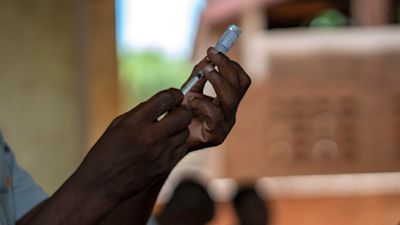New Malaria vaccine could reduce deaths by 70% in 'breakthrough moment', experts say

Malaria kills more than 600,000 people a year. Most of them in sub Saharan Africa and the vast majority are children.
The parasite, which infects the liver and blood, has confounded scientists for more than a century and evaded vaccines for decades. Until now.
It is quite something to be able to write that.
When you think that a child dies every 30 seconds from malaria and when you know how difficult it has been for scientists to find the right protein to target in the parasite, which then induces immunity against it.
A team at the Jenner Institute at Oxford University have done it though, creating the world’s most effective malaria vaccine ever.
New results from their Phase II trial in west Africa show, a booster jab after three doses of vaccine, has an efficacy of 80%.
It is so high it smashes the World Health Organization’s efficacy goal of 75%, as well as GlaxoSmithKline’s offering which only prevents about 30% of severe malaria cases.
The people behind the vaccine are modest.
They are not competing with other scientists they say and will not be drawn into comments that the efficacy of their jab blows GSK’s out the water.
The point they make, rightly perhaps, is that any vaccine against this brutal disease is a game changer and the more vaccines there are, the more likely it is we will see it eradicated in our lifetimes.
In fact, Adrian Hill, the head of the Jenner Institute, hopes his vaccine will reduce deaths by 70% in just seven years.
There are a number of reasons the Oxford jab is so successful, with a much higher efficacy than GSK’s.
Firstly, their vaccine was built on a more modern, improved platform. GSK have been working on theirs for 30 years, so the technology they’ve used is not as advanced.
The second is the jabs were given to trial participants just before the rainy season, when malaria can be at its worst.
This, the team say, gave the vaccine a huge advantage.
Another advantage that Adrian Hill has is their ability to produce millions of doses very quickly.
They’ve teamed up with the Serum Institute in India and hope to manufacture 150 million doses by early next year.
That sort of production means millions of children could have the jab in their arms straight away.
There is also a pipe dream to eventually manufacture the vaccine in Africa, the Serum want to set up production there, making it even easier to distribute at speed.
None of this is free though. In order to get the vaccine made and on the ground, millions of pounds of funding is still needed.
It seems incredible that an inoculation that could save hundreds of thousands of children’s lives and get Africa out of its horrendous cycle of mortality is still at the mercy of government decisions on whether to fund the roll out.
Britain is one of the biggest donors to the Global Fund but since the pandemic there have been stark warnings to all nations that funding has to increase or we can abandon any hope of ending malaria, TB and Aids.
As Foreign Secretary, Liz Truss cast doubt on our commitment to multilateral organisations, like Global Fund. It’s hoped as Prime Minister she has a change of heart.
R21/Matrix-M is already in Phase III trials, testing large scale safety and efficacy in 4,800 children.
Results of this final stage before it is considered for approval are due later this year but the World Health Organization is already assessing data and it would be extraordinary for it now not to be recommended for use.
This really is the breakthrough moment we’ve been waiting years for. It is the time when we can actually say, malaria can be eliminated ten years.
The science is there now we just need the will of the world to get behind it.
Want a quick and expert briefing on the biggest news stories? Listen to our latest podcasts to find out What You Need To Know...